THE DOOMSMAN (26)
By:
August 23, 2024
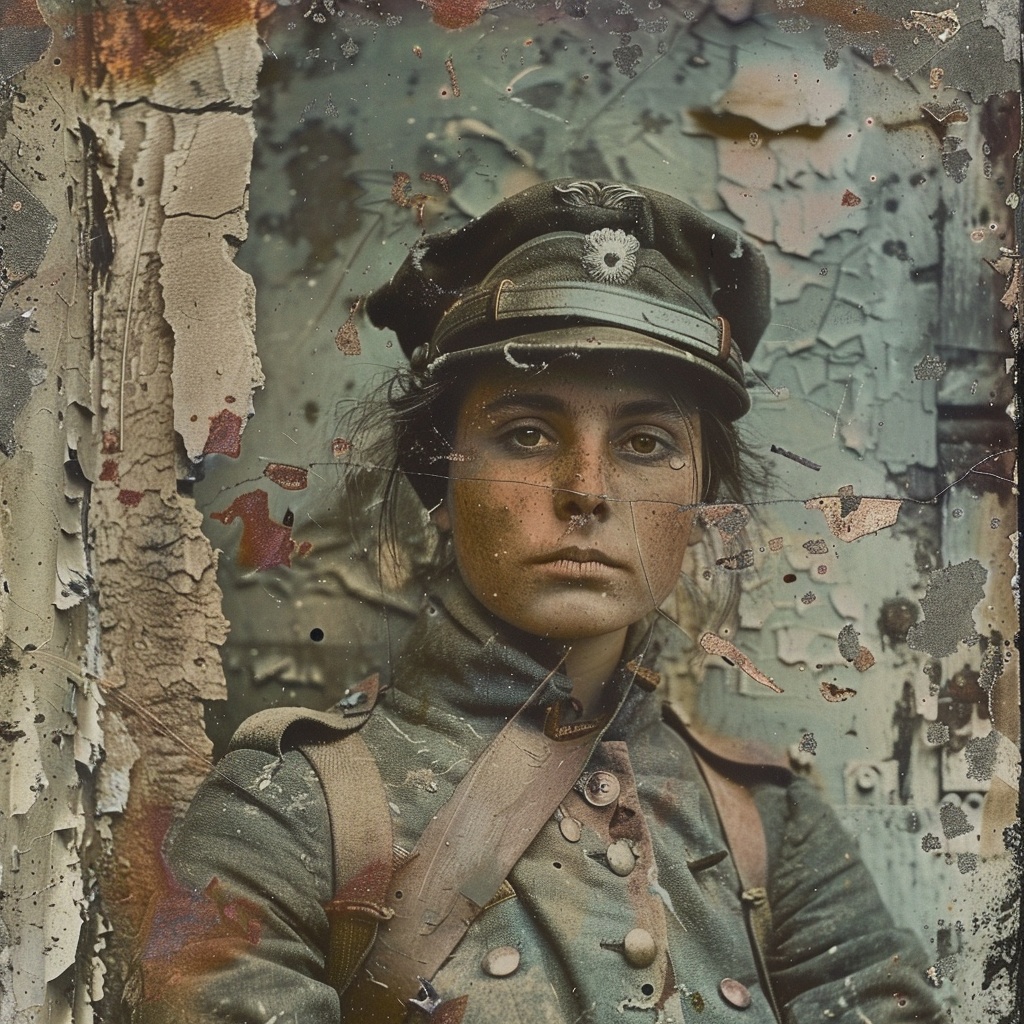
Set ninety years after the cataclysmic pandemic of 1925, Van Tassel Sutphen’s The Doomsman imagines a Kamandi-like future in which medievalized American tribes struggle with the marauding Doomsmen for control of the ruins of New York City… where a mad priest worships a powerful technology. HiLoBooks is pleased to serialize this 1905–1906 proto-sf novel for HILOBROW’s readers.
ALL INSTALLMENTS: 1 | 2 | 3 | 4 | 5 | 6 | 7 | 8 | 9 | 10 | 11 | 12 | 13 | 14 | 15 | 16 | 17 | 18 | 19 | 20 | 21 | 22 | 23 | 24 | 25 | 26 | 27 | 28 | 29 | 30.
THE SONG OF THE SWORD
It did not take long for Constans to arouse and collect his men; tired of inaction, they were only too glad to respond to the summons. And at the last, Constans, unable to withstand the entreaty in Red Oxenford’s eyes, ordered his release.
“But, with the others, you must wait upon my word,” he said, sternly, and Oxenford, fearful above all things of being left behind, gave ready assent to the condition.
Under the south rampart of the citadel they halted. There were but two guards on duty here, and they were easily surprised and secured before they could give an alarm. As one by one the rest of the company ascended the scaling-ladder, they were ordered to throw themselves prone on the flat top of the wall, to await the final signal. Over at the north gate the clamor grew momentarily — there were blows of axes on wood, and clash of arms, and the confused crying of many voices.
“The snapping-turtle must be at his work,” said Constans to himself. “Wait until his teeth show through that flimsy wooden screen.”
Piers Major had advanced promptly upon receiving the message brought by his son. The chances of a frontal attack had already been discussed between him and Constans, and the latter had devised a formation which, in theory at least, should make such an undertaking feasible. In its basic idea it was the Roman testudo, described by Julius Cæsar in the Gallic Commentaries. The phalanx of marching men were protected from arrows, darts, and ordinary missiles by a continuous covering formed of their ox-hide shields, the latter being held horizontally above the head and interlocked. The overlapping shields bore a fanciful resemblance to the scaly carapace of a tortoise — hence its name; and, so long as the essential principle of unity of action was maintained, it might be reckoned an effective engine of warfare.
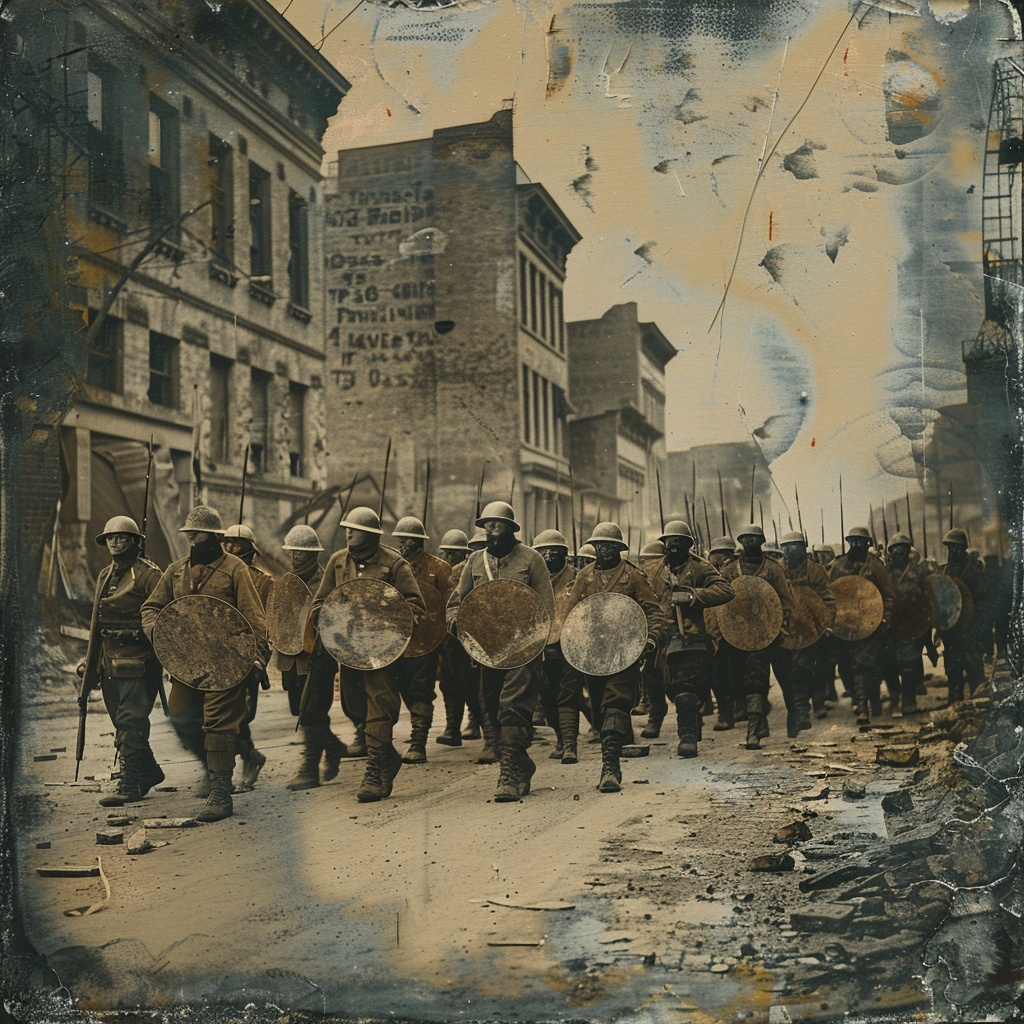
As the testudo moved down the Palace Road and towards the wooden barrier of the north gate, it was to be observed that the front-rank men and the file-closers carried their shields in the ordinary fashion, in order to ward off horizontally flying missiles. Once under the shelter of the walls, the leaders would immediately discard their now useless bucklers and begin to ply their axes, protected from overhead assaults by the overlapping shields of their comrades. The formation advanced steadily; there was a suggestion of terrific irresistibility in the very slowness of its progress; to the eager fancy it might have been the veritable recreation of some prehistoric monster, the illusion being heightened by the torchlight that flickered uncertainly over the rounded bellies of the shields of greenish leather and was reflected redly from their copper bosses.
The defence had been quick to recognize the character of the assault, and had done their best to repel it. The catapults had been brought into action, and their huge projectiles hurtled constantly through the air, but for the most part innocuously, the machines not being in the best of order and the artillerymen unpractised in their use. It was not until the testudo had advanced to within fifty yards that a shot discharged by a machine, worked by Quinton Edge in person, took effect, the missile striking the testudo on the left wing and disabling three men. Before the advantage could be followed up the files had been closed again and the formation had advanced so far that the catapults became useless, it being impossible to depress them beyond a certain angle. The front rank had now reached the barrier, and the axes fell furiously upon the wooden leaves of the gate. The Doomsmen on the walls renewed the attack with hand-weapons, the slingers and archers hurling their missiles vertically downward and the spearmen watching their opportunity for an effective body-thrust. The affair would be short and sharp, for the testudo could not be expected to hold its position for longer than a few minutes — it was not in flesh and blood to withstand indefinitely that fierce and deadly shower. Already there were gaps in the protective roof of shields — impossible to repair, for in that close-packed mass the bodies of the wounded and dead impeded the progress of those who would otherwise have taken their places. Yet the struggle went stubbornly on.
A sharp-eyed youth who was lying next to Constans touched him on the arm, directing his attention to a squad of the defenders who were working to dislodge one of the massive coping-stones of the gateway arch. Already it was oscillating under the heave of the levers; if it fell, a score of men might be crushed beneath its weight, and the destruction of the testudo would be a certainty. Constans raised his rifle. It was a long shot, but he could not wait to take deliberate aim; he fired.
The bullet had found its mark, for one man was fallen where he stood and another nursed a broken wrist. The workers at the gate were thrown into confusion and the stone settled back into its bed. The assailants redoubled their efforts, and the thunder of the axe-blows became continuous.
“Through! they are through!” shouted Constans, and sprang down upon the banquette. In his excitement he entirely forgot about the new weapon that had but just now rendered such signal service; he threw aside the rifle for the more familiar sword. And he noticed that his followers had acted under the same primitive impulse; the fire-stick might be given the honor of drawing first blood, but it was for cold steel to finish the work.
Shoulder to shoulder the men raced across the square to the gate. The attempt to block up the passage, had failed for lack of time, and the Stockaders were pouring through pellmell, intent on securing foothold in the open. The Doomsmen, forsaking the now useless walls, met them man to man; there was the clash of opposing bucklers, and through the din pierced the keen, clear ring of blades in play — the Song of the Sword.
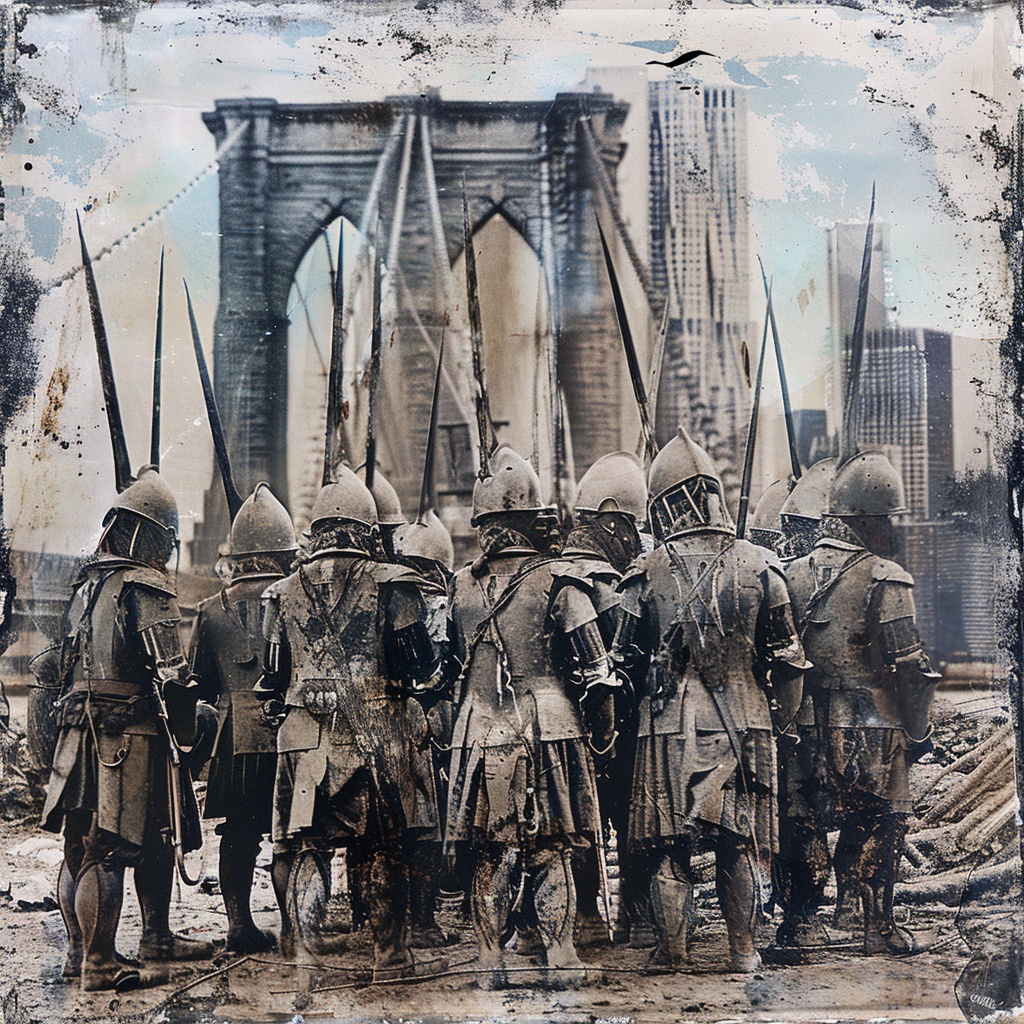
The diversion in the rear came at the opportune moment. The Doomsmen had so far greatly out-numbered the Stockaders, and the latter were being forced back into the vaulted passage, thereby blocking it against the main body of their comrades. But now the Doomsmen, attacked from behind, were obliged to devote part of their attention elsewhere, the pressure at the gateway was relieved, and reinforcements, with Piers Major and Piers Minor at their head, made their way through and took active part in the struggle. Even then the defenders were slightly superior numerically to the invading party, and the issue remained in doubt.
Constans felt himself carried into the thickest of the press; he fought on mechanically, thrusting and cutting with the rest, and yet hardly conscious of what he was doing. His mind would not work easily; he found himself dwelling upon inconsequential trifles — what had become of his cap? and how tall was that big fellow with the broad-axe who seemed so anxious to come to close quarters with him? He was not in the least afraid, but he wondered if it were possible for him to come out of all this alive. It seemed unthinkable that the ring of steel surrounding him could be broken by any mortal power; sooner or later it must contract and crush him. Even the momentary vision of Ulick, stripped to the waist and with a broad, red streak across his forehead, failed to arouse him. He could think only of a thresher with his flail as Ulick, bludgeoning right and left, won clear from the press of Stockader foes surrounding him and rejoined his own ranks. A confused idea that he wanted to speak to Ulick suddenly oppressed Constans; he half started to follow him. Piers Minor, at his elbow, held him back and shouted a caution.
“Keep up your guard, man, or that big chap will have you yet! And let them come to you — don’t rush them!”
In a hand-to-hand encounter there can be but little opportunity for strategy or leadership, except in the purely physical sense. Yet, on either side, the men fought as though animated by a common instinct, the Doomsmen striving to force the Stockaders back into the gateway passage, and the latter endeavoring to cut their way bodily through the mass of the defenders and so divide its strength. For a while the tide began to run with the allies, and the Doomsmen were obliged to fall back slowly towards the interior barricade on the east side of the square that protected the women and children. Constans, panting from his exertions, snatched at this moment of respite to regain his breath. A moment before he had stumbled against a small keg that was rolling about under the feet of the struggling men; this he up-ended and mounted for a better look around.
It was true; the Doomsmen were really giving way, and the victory was all but won. Yet not quite, for even as he gazed the onrushing line of the triumphant Stockaders sagged backward at the centre, and the Doomsman yell broke out. What was it? What had happened?
Emerging from the portal of the White Tower came half a dozen bearers carrying between them a chair in which sat a man — an old man with a shock of snow-white hair covering his massive head. And those shoulders needed no identification from the familiar wolf-skin that lay across them. This could be none other than Dom Gillian, Chief and Overlord of the Doomsmen, Father of the Gray People. He wore no armor and carried no shield, but his hand gripped a great war-mace studded with silver nails, fit emblem of the authority supreme that its own weight had created. But that had been full half a century ago.
The old man made a movement as though to rise. Two of the attendants attempted to assist him, but he waved them back. Ah, the wonder of it as that huge bulk reared itself to full height! An ordinary man might stand comfortably under his out-stretched arm and barely join the tips of his fingers in measuring around the monster’s girth. But there was more than mere bigness with which to reckon. The close observer might notice that his armpits and the corresponding parts under the knee were not hollow, as is ordinarily the case, but were filled with a solid mass of muscle and tendon. And this was Dom Gillian, with the weight of ninety-odd years upon his back. What manner of man must he have been in the noonday of his strength!
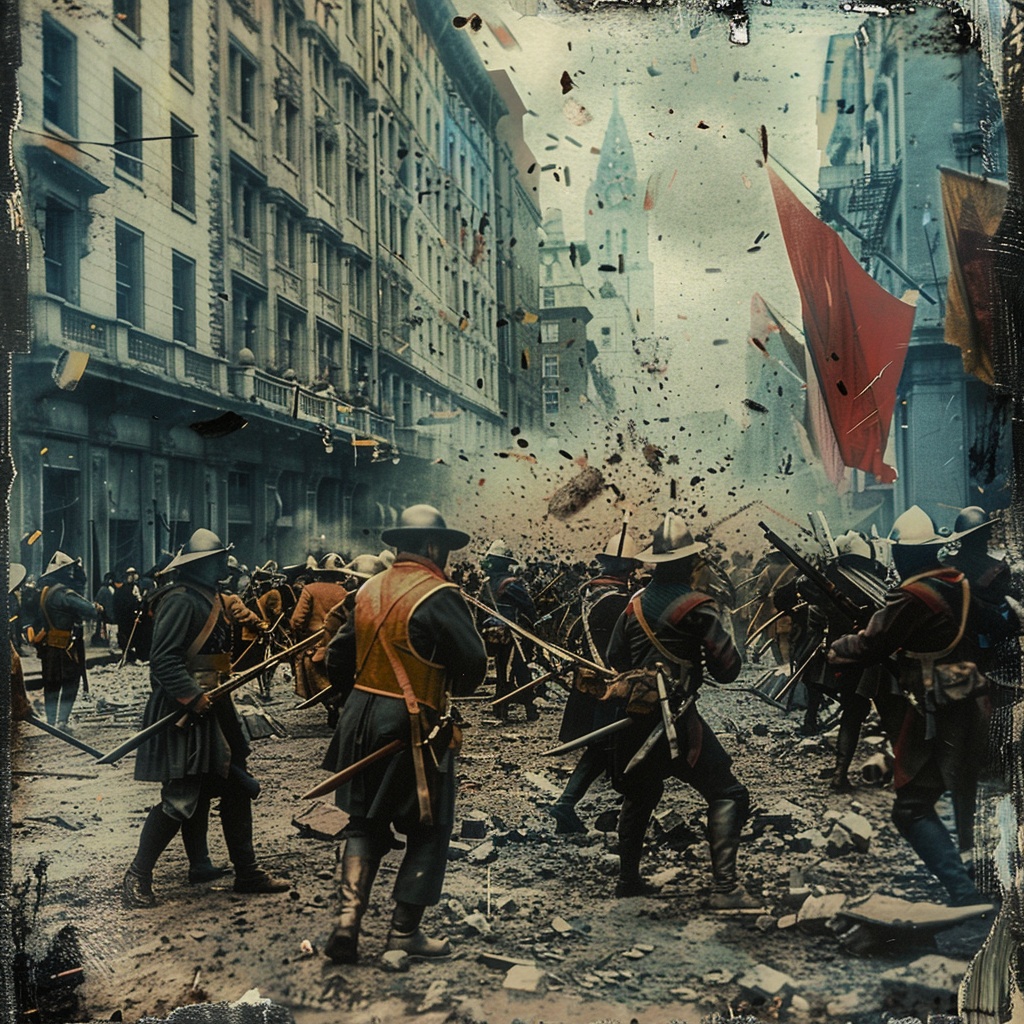
As though by common consent the conflict came to an abrupt end; the two lines drew apart and silence fell between them. Dom Gillian took two or three forward steps. He seemed to be uncertain of where to plant his feet, as is the natural consequent when one has not walked for a long time; but once squarely set, he stood solidly — like a column of masonry. The bent shoulders had straightened up and the chest had filled out; there was no evidence of decrepitude in the ease with which he manipulated his ponderous mace, swinging it from side to side in great, slow circles. Only Constans noticed that he kept his head turned constantly in one direction, where there was a great flare of light, a dozen cressets and link-torches burning together. Could it be that his eyesight had failed save for the mere distinction between light and darkness? It might be well to know surely, and, stepping down from his vantage-point, Constans forced his way to the front. Quinton Edge was speaking, and Constans listened with the rest.
“If there is one among you,” he said, with smooth distinctness, “who thinks himself a man, let him stand forth and make answer to our father, Dom Gillian, face to face, so that our lord may particularly inquire concerning these dogs of Stockaders who dare to show a naked blade in the inmost citadel of Doom the Forbidden. You have tracked the gray wolf to his lair, now send you out a gallant who will clip his claws.”
Constans, intent upon his theory, noticed that Dom Gillian had turned his head in the direction of Quinton Edge’s voice when he first began to speak, but almost immediately his attention had flagged and his eyes had wandered back to the lights. Now, as Quinton Edge stopped, the old man’s face changed suddenly, the eyebrows contracting and the jaw setting itself rigidly. It seemed as though he were about to speak, but there was only that murmur in his throat, hoarse and unintelligible. Then Constans understood that this was no longer a man that stood before them, but merely a wild beast in leash. The monster seemed annoyed by the silence. He moved forward uncertainly for a few steps and stood still; one could hear him purring softly like a big cat.
“We are waiting,” said Quinton Edge.
A man brushed by Constans and stepped into the open. It was Oxenford the “Red.”
“This belongs to me — to none other,” he said, and looked about him.
No man moved.
“I am ready,” he continued, and threw his upper coat on the ground behind him. Constans stood for an instant at Oxenford’s ear.
“The old wolf is nearly blind,” he whispered. “Take care not to get between him and the light yonder and you have a chance.”
Oxenford nodded. His manner was quiet and collected, and his face, though pale, had lost the strained look that had characterized it for these last few days. “Stand clear!” he said, and Constans moved away and stood watching.
Man to man, Oxenford, though by no means a weakling, was yet outclassed in every particular of height, weight, and reach. But he possessed one inestimable advantage — that of agility. Quick footwork should save him at even the closest pinch — that and his wits. Then, if the giant were really blind!
Realizing the futility of trying to meet Dom Gillian with weapons similar to his own, Oxenford had provided himself with a simple truncheon of lignum-vitæ, while in his belt was stuck a broad-bladed, double-edged knife. The latter was for close quarters, but it would require some manœuvring to get there, and Dom Gillian would ask opportunity but for one clean stroke.
The men faced each other steadily for perhaps a minute. Then Oxenford rapped his antagonist smartly across the knuckles and sprang back out of reach. The colossus, with a growl, swung his mace to right and left, striking at random, for Oxenford had cunningly contrived to turn Dom Gillian so that the light was at his back. Quinton Edge must have noticed the ruse, for he beckoned to an attendant and ordered that every available torch and cresset should be placed about the arena. But the affair was over long before the command could be obeyed.
Again the giant struck out, and this time so strongly that he came near to losing his balance. Oxenford, rushing in, discharged a quick half-arm blow on the Doomsman’s right wrist, and the mace dropped from the suddenly paralyzed grip. Confused and terror-stricken, Dom Gillian dropped on all-fours, groping about in the darkness for the weapon that had rolled away and out of immediate reach. Oxenford, drawing his knife, struck downward, aiming for the angle of neck and collar-bone. But in his eagerness he overshot the mark, the blade making only a trifling flesh wound, and the next instant Dom Gillian had him in his clutch. The two stood up together.
It seemed a long time, hours indeed, that Dom Gillian waited for his injured wrist to recover its strength, holding Oxenford easily in his left hand and shaking the other incessantly to restore the interrupted circulation. Even when at last satisfied that the wrist could be trusted to do its duty, he did not appear to be in any hurry; he seemed to be meditating upon the most effective use to which he could apply the advantage that he had gained. Then, suddenly, Dom Gillian bent down and grasped his victim by the ankles, swinging Oxenford into the air as easily as a thresher does his flail. With every muscle starting to the strain, the Doomsman whirled his enemy’s body once, twice, and thrice, at full sweep about his head, then downward into crushing contact with the pavement. A final superhuman effort, and the inert mass was hurled clean over the heads of the on-lookers, falling with the dead sound of over-ripe fruit against the wall of the White Tower.
A full minute passed, and still every eye remained fixed on Dom Gillian. He had not moved, except to turn his head again in the direction of the light — a dumb instinct like to the compass-needle that seeks the magnetic pole. A colossal statue, but Constans fancied that it was swaying at its base, then he saw the great chest heave convulsively and a bubble of reddish foam issuing at his lips.
But the man was dying hard; in another moment he had straightened up, and was resolutely swallowing back the salty, suffocating tide, beating the air with his hands as he strove for breath. Only for an instant, however, for now the tide had become a flood, and, with a little fretful moan, like to that of a tired child, Dom Gillian, Overlord of Doom, sank to earth, not falling headlong, as does a felled tree, but quietly settling into a heap, just as an empty bag collapses into itself.
The fighting had begun again; no man could say why or how. True, the Doomsmen had been disheartened by the fall of their champion, but they were not yet ready to yield themselves; they had retreated to the shelter of the interior barricade, and would make there a final stand. The Stockaders, flushed with anticipated triumph, drove blindly, recklessly at the barrier. Constans felt the blood singing in his ears, then a weight suddenly lifted from his brain; his eyes cleared and the fierce joy of conflict captured him. He forced his way to the front, gaining foothold on the barricade. Ten feet away stood Quinton Edge, and Constans’s heart was glad. At last!
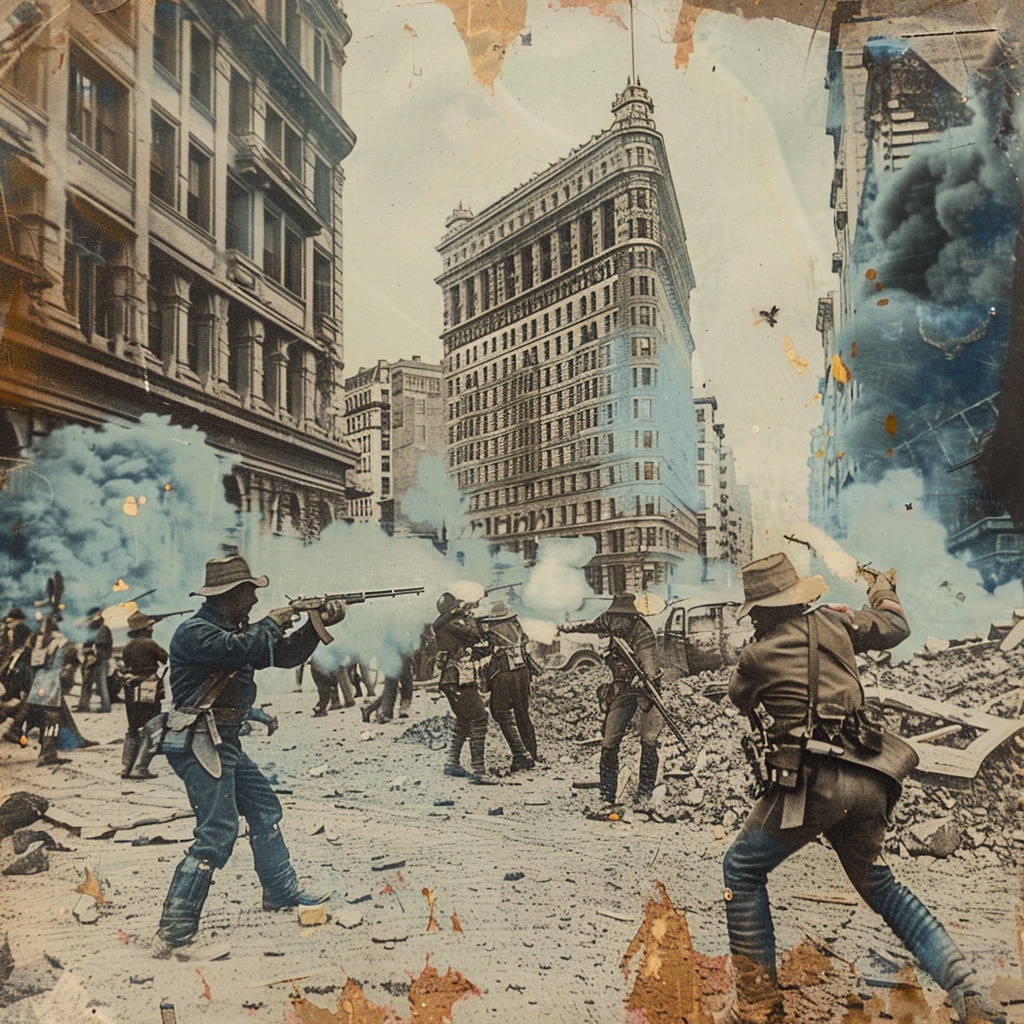
A hand caught at the skirt of his doublet, and impatiently he jerked himself loose. Again the detaining grasp; he bent down to strike and looked into Ulick’s eyes. Obedient to the unspoken request, he knelt down and tried to move his friend into a more comfortable position. The crushed chest sank horribly under his hands, and he was obliged to give over.
“Close to me,” whispered Ulick, and Constans bent his head to listen.
“It is of Esmay,” he said. “Nanna but just now told me — a prisoner — Arcadia House — you will go to her?”
“Yes,” said Constans.
But Ulick had followed the direction of his eyes and seen that they rested on Quinton Edge.
“At once; it must be now — else too late.”
Constans did not answer.
“Now!” reiterated Ulick, insistently.
“I cannot.”
“Yes.”
“I will not.”
“Yes.”
Constans’s voice was hard; he rose to his feet.
“I have been waiting upon this chance for years — you do not understand.”
“Ye — —I understand.”
“All along; it was you who loved her.”
“But you — whom she loved.”
“No,” said Constans, sullenly.
“It is — true.”
“No!” again cried Constans. Then, suddenly, it seemed that a great light shone about him. But the wonder of it lay not in this new knowledge of Esmay’s heart, but in the revelation of his own. He loved her, he knew it now, and not as in that brief moment of passion at Arcadia, when even honor seemed well lost. For this was the greater love that draws a man to the one woman in the world who has the power to lift him to the heights whereon she herself stands. A supreme joy, that humbled even while it exalted, swept over Constans. “I will go,” he said, and took Ulick’s hand in both his own.
The storm-centre of the fighting had moved away from them; above their heads the stars shone serenely. Constans could not speak, but he pointed them out to his friend.
Piers Minor, fighting in the press at the gate as became his stout breed, chanced to rescue a boy from being crushed to death. The lad had been crowded up against a projecting angle and was quite breathless when the Stockader, arching his back against the pressure, broke the jam by sheer strength and pulled the stripling out of his dangerous position. But what a fine color came back into the white cheeks as the twain recognized each other!
“You!” said Nanna, and at that moment she would have given all she possessed in the world for just a skirt.
“You!” re-echoed Piers Minor, and immediately a horrible dumbness fell upon him.
The thunder of the captains and the shouting filled their ears, but they heard not, the red light of battle danced before their eyes, but they saw not. Some miracle swept them clear of the struggle, and guided them to the shelter afforded by a half-completed barricade of ox-carts. And here Piers Minor, seeing that she trembled and edged closer to him like any ordinary woman, took on a wonderful accession of courage.
“Little one!” he murmured, in his big, bass voice, and laughed contentedly, just as though death were not standing at his other elbow. But then Piers Minor was not a man to think of more than one thing at a time.
“I have seen Ulick,” whispered Nanna, “and he promised to give the message to Constans. Surely he will do so — tell me?”
Piers Minor put his arm around her. “Of course,” he answered, stoutly, without comprehending in the least who Ulick was or what the message could be about. But he did understand that she wanted comfort in her trouble, and so he said and did precisely the right thing. All of which was exceedingly clever for Piers Minor.
Some one brushed rudely against them, and Piers Minor turned in anger. But Nanna laid her hand upon his arm. “Hush!” she said, “it is Prosper, the priest.”
The old man stood motionless for an instant surveying the wild scene before him.
“It is the third day,” he muttered, “the day of Doom. The day and now the hour. So be it, lord; it is thy will, and I obey.”
With the last word he wheeled and disappeared into the shadows. An intuitive sense of the impending peril seized the girl. “Come!” she panted, and dragged at her companion’s sleeve. “It is the vengeance of the Shining One. But there is a chance — if we follow.”
Piers Minor did not hesitate. “As you will,” he said, briefly, and Nanna flashed back at him a brilliant smile, hand-in-hand they sped through the now deserted passageway of the north gate.
For the last time Constans bent his lips to the ear of the dying man. “Ulick!” he called. There was no answer, and Constans felt that the hand that lay in his was growing cold. Then for one brief instant the soul looked out from the hollowed eyes.
“The sun!” he said, and smiled as one who, having kept the watches of a long night, looks upon the dawn. “The sun!” he cried again, and his spirit went forth to meet it.
Constans rose unsteadily to his feet.
The sun! A vivid glare beat down upon him. The sun! and rising in the west!
A vast shaft of fire shot upward to the zenith, and all along the western horizon pinnacles and roof-line stood out etched in crimson. Constans saw that the entire quarter of the city west of the Citadel Square was in conflagration, and the flames, borne on the wings of a northwest gale, came driving swiftly down. A rain of red-hot cinders fell about him.
A shout of terror went up from Doomsmen and Stockader alike, and the fighting ended abruptly. Then began a rush for the gate, victors and vanquished mingled indiscriminately together, constrained only by the one common impulse to seek refuge in flight. To add to the confusion, fresh explosions were heard on the north and south, followed almost immediately by the appearance of flames in these latter quarters. Where, then, led the path to safety?
Constans, running towards the southern rampart, where he knew he should find his ladder, saw a tall figure just ahead of him. He recognized Quinton Edge, but the Doomsman had reached and scaled the wall before Constans could overtake him. Yet he caught a glimpse of his enemy proceeding rapidly in a northeast direction. Constans followed immediately, tightening his belt for the hard run that lay before him.
RADIUM AGE PROTO-SF: “Radium Age” is Josh Glenn’s name for the nascent sf genre’s c. 1900–1935 era, a period which saw the discovery of radioactivity, i.e., the revelation that matter itself is constantly in movement — a fitting metaphor for the first decades of the 20th century, during which old scientific, religious, political, and social certainties were shattered. More info here.
SERIALIZED BY HILOBOOKS: James Parker’s Cocky the Fox | Annalee Newitz’s “The Great Oxygen Race” | Matthew Battles’s “Imago” | & many more original and reissued novels and stories.
